Like any junkie with an addiction, the first step is admitting that you have a problem.
It was no sooner than Paul Krugman came out less than two months ago declaring a win for what he called “Team Transitory” that Jerome Powell sat in front of a Senate panel and was forced to admit he had a problem.
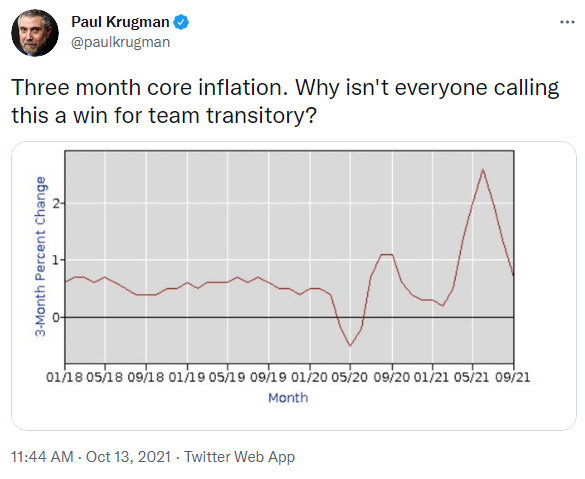
Powell seemed to come to terms yesterday that he was stuck between a rock (brutal, unrelenting consumer inflation) and a hard place (the inability to raise rates or taper without fuck-tangling the entire economy and capital markets).
The Fed Chair admitted in front of a Senate panel yesterday that “it’s probably a good time to retire” the word “transitory” to describe inflation.
He continued: “At this point, the economy is very strong and inflationary pressures are higher, and it is therefore appropriate in my view to consider wrapping up the taper of our asset purchases, which we actually announced at the November meeting, perhaps a few months sooner,” according to CNBC.
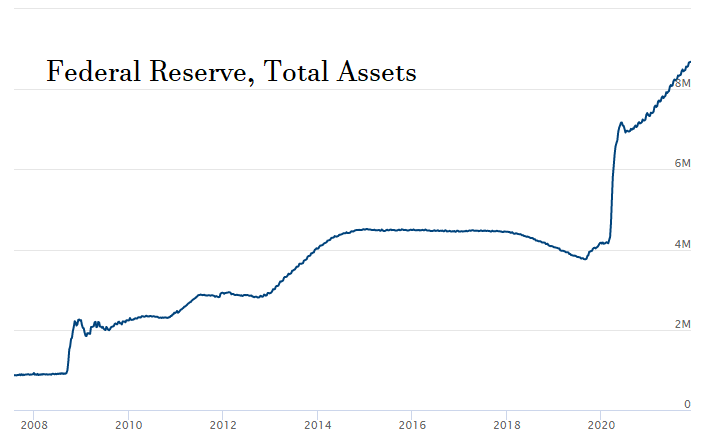
Of course, to those of us without our heads up our asses over the last 18 months, like Jerome Powell, this admission doesn’t come as that much of a surprise. I have been covering, writing and ranting [here, here, here and here] about why I believed it was obvious that the inflation we’re experiencing is not transitory, for months now.
In fact, I would argue that the extent of the coming inflation problem has been pretty obvious to just about anybody. This makes it extra hilarious that the Fed has been hiding behind this vaudeville act of pretending they just noticed that inflation has barely nudged above their 2% target. The reality is that price hikes for the everyday American are 10%, 20%, sometimes up to 50% on products and services they need for their day-to-day lives.
In addition to what we can experience with our very own eyes and wallets, every single major consumer products manufacturer and industrial company has commented that their cost of raw materials has gone up. The American public has been so aware of inflation, it has even become a part of the mainstream media narrative on both the left and the right.
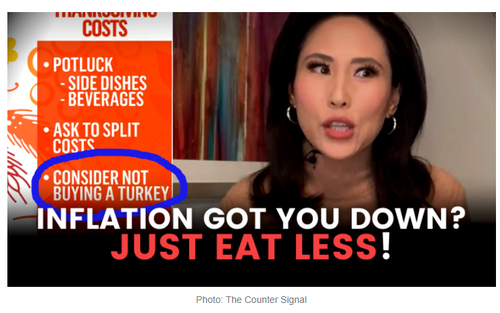
Inflation has been out of control for years now: you know it, and now nobody can say that the Fed doesn’t know it.
In addition to relinquishing the “transitory” term yesterday, Powell even indicated to the Senate panel that accelerating their taper and considering rate hikes were on the table.
This is especially bold language in the face of the newly-discovered omicron variant, which I predicted days ago would give the Fed a perfect excuse if they wanted to to continue quantitative easing.
While I happen to think this will be the Delta variant part 2 (in that it drums up a lot of hysteria and then everyone eventually ignores it), that doesn’t mean the government and markets won’t overreact to the news.
Remember, scary sounding words like “mutation”, “spike protein” and “variant” are a prompt to act like hysterical hyenas and usurp power unilaterally for those on the left side of the aisle (read: our entire government right now).
But based on Powell’s testimony yesterday, it looks like the problem of high prices is going to take precedence over using omicron as another crutch to push a socialist modern monetary theory agenda - at least for the time being.
And while uncertainty surrounding omicron is part of the discussion, markets plunged on Tuesday of this week mainly because of the verbiage Powell used when describing the taper and potential rate hikes, in my opinion.
The only question now is whether Powell has the stones to stand by his hawkishness.
If the Fed does look to accelerate the taper and toss around the idea of rate hikes in order to try and rope inflation in, as indicated, I think we can expect further downside in equity markets in December, as I predicted about a week ago. In fact, Powell doesn’t even have to re-acknowledge what he said yesterday, he simply has to say nothing until the Fed’s next official nod to the markets.
That isn’t to say that his taper/rate hike plan is or isn’t going to work. It’s only to say that it will introduce a significant amount of volatility to markets that hasn’t been there over the last year and a half. In other words, if your strategy is like that Target manager that made a million dollars shorting the VIX 2018, it might be a great time to take a month off.
In a volatile situation, I would expect small caps and technology to get hit the hardest, with some rotation into blue chips, staples and Dow Industrials, although these three areas of respite may eventually wind up lower as well.
From there, it’s going to be a question of how inflation responds and how much leeway the market gives the Fed before fear of an impending credit catastrophe starts to spread.
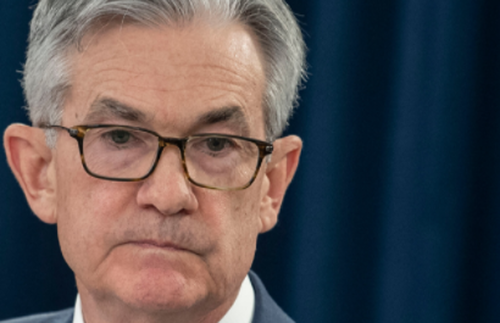
Of course, the newfound hawkishness also leaves Powell room to backtrack - something that the Fed loves to do and are experts in - by slowing the taper or pushing rate hikes back further.
At least for now, however, the market appears to have started to take its medicine due to Powell’s change of stance.
As of today, the omicron variant doesn’t look like it’s going to have a material effect on the Covid universe. That is, except for the effect our overreaching government wants to cause themselves.
While most indications over the last 72 hours have been that omicron isn’t more deadly than other variants, the government doesn’t seem to care and has already sought out new restrictions that will once again throw a wrench in the gears of business, industry and people’s daily lives.
Creating a problem where there isn’t one: it’s the Keynesian Government’s way.
Precious metals were higher on the day yesterday before Powell’s testimony, when they shifted drastically lower on expectations of hawkish policy. An interesting setup for gold here is that it may actually transition from being an inflationary hedge to just a hedge for market volatility and systemic risk. If we start to try and redline a taper or rate hikes and the economy or credit markets start to get really volatile, gold may be still seen as a safe haven, despite the fact that the clear and present worry wouldn’t necessarily be inflation at the time. I think this is why my friend Rosemont Seneca wants to own it heading into 2022.
But of course there’s also many of the school that believe inflation is coming no matter what the outcome over the next several months is. Many believe that the Fed won’t be able to raise rates because they won’t be able to service the national debt or do so without creating a credit crisis. Ergo, the only option is then to try to print their way out of the corner they have painted themselves in.
I think both of these scenarios act as a tailwind for gold.
I also think commodities may still be in play as demand fears from omicron will eventually fade away, in my opinion. Omicron will, in my opinion, go the way of the Delta variant, in that it’ll be a great new scary sounding headline for people in the liberal media to push, but the everyday person isn’t going to give a shit about it.
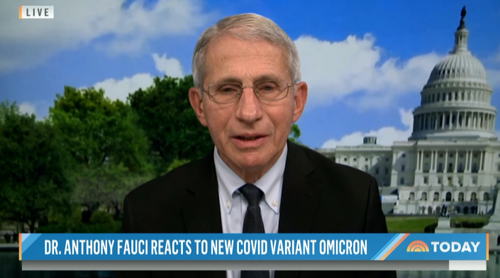
What is important here is that it truly looks like the Fed is trying to shift gears. It looks like we’re heading into a new era as we move into December and into 2022.
I had a feeling this type of volatility would be on its way heading into the end of the year because the Fed has painted itself into a very difficult corner to get out of.
While I don’t think they have done anything productive in terms of bringing new solutions to the inflation problem to the table, they have at least acknowledged the fact that they have lost control.
Yesterday may only be the beginning of the every day investor realizing not just that there’s an inflation problem, but more importantly that we may not have the solution for it.



No comments:
Post a Comment